Lilium is a Munich, Germany-based aerospace startup developing a revolutionary on-demand air taxi service that is powered by the all-electric, vertical take-off and landing Lilium Jet.
Just six months after revealing the all-electric, five-seater Lilium Jet for the first time, Lilium is now flying at speeds in excess of 62.1 miles per hour (100 km/hour)
First revealed in May 2019, the Lilium Jet, a five-seater, fully-electric unmanned aircraft that can take-off and land vertically (eVTOL), will enable it to address a trillion-dollar market opportunity that will not only change the way people choose to live and travel but will also connect communities at a fraction of the cost of conventional high-speed infrastructure such as road and rail. The five-seat Lilium Jet targets a range of 186.4 miles or 300 km (160 nautical miles), its 36 electric ducted fans are powered by a 1 MW (1,300 hp) lithium-ion battery, less than 200 hp (150 kW) are required to cruise.
Lilium Jet is flight tested at Oberpfaffenhofen airfield near Munich. It is powered by 36 electric motors, each acting on a ducted propeller. There are six of them on each of the two front wings and twelve on each rear wing. Additionally to the fixed part of the wings, the propellers and engines are each installed in twelve tiltable wing parts. They are referred to by the manufacturer in analogy to landing flaps as flaps. The drive-carrying “flaps” are pivoted downwards for vertical launch. At the transition in the horizontal position, a forward thrust is generated. This is energetically much more economical than the lift by pure rotorcraft.
By October 2019, after 100 flights, it was transitioned from vertical to horizontal flight, reaching over 62.1 miles per hour (100 km/hour), but not yet fully horizontal. It managed 25° banked turns, high ascent/descent rates like in operations, hover turns and sideward translations. Electrical, fan and flap failures were mitigated by the electrical and flight control systems.
Co-founded in 2015 by four visionary founders, Daniel Wiegand (CEO), Sebastian Born, Matthias Meiner and Patrick Nathen, the company has attracted more than $100m in funding from world-class investors such as Atomico, Tencent, LGT, Freigeist and Obvious Ventures. The company employs around 350 people in Munich and expects to create around 500 jobs by 2025.
Source: Tech Start Ups

